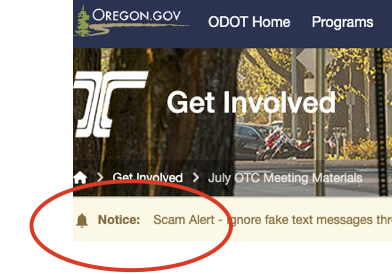Caution: Scam Alert
The Oregon Department of Transportation’s plans to move ahead with the I-5 Rose Quarter project when it lost over $400 million in federal grants, was refused additional funding by the 2025 Oregon Legislature and doesn’t have any toll revenue constitutes a scam.
At the base of ODOT’s web page banner is a “Scam Alert” notice, telling people to ignore fake text messages threatening registration suspension or fines.
ODOT should really be alerting the public to a scam that the agency itself is perpetrating. Its decision to move ahead with expensive, unfunded highway projects even after the Legislature rejected needed funding and the federal government took back a $400 million grant is what is making the agency’s financial problems worse.
As we reported a six weeks ago, the “Big Beautiful Bill” rescinded more than $400 million in federal grant funds allocated to the I-5 Rose Quarter project by the Biden Administration. The project itself, originally billed as costing $450 million has ballooned to more than $2.1 billion. The loss of federal funds is a major blow, but that’s not all.
The Legislature said “NO.” The 2025 Oregon Legislature adjourned without approving a major transportation bill. A key part of that bill, HB 2025 was the proposed creation of a $125 million annual allocation–called the “Anchor Projects Fund.” That revenue would be worth a total of perhaps $1.5 billion for current construction if bonded, would have been used to pay for a wish list of expensive mega-projects, including the troubled Rose Quarter freeway widening.
Never mind that the amount allocated was vastly less that the actual cost of these projects (by $3 -4 billion), the Legislature’s decision not to support HB 2025, and its anchor project funds means the Legislature said “no” to these projects.
For years, the agency has claimed that it needed to proceed with the Rose Quarter project because it had the 2017 Legislature’s authorization to spend the $450 million ODOT had said the project would cost. Now that ODOT asked for more, and didn’t get it, they can’t reasonably claim that it has legislative approval and direction to undertake the costly project.
Also, a key part of the HB 2017 “commitment”–i.e. the money to actually pay for ODOT’s mega-projects, was supposed to come from tolling I-5 and I-205 throughout he Portland area, a policy that is a cornerstone of both state and regional plans to reduce greenhouse gas emissions. But Governor Kotek has effectively cancelled tolling, and key legislators are making outright repeal of that provision a condition for a possible special session.
In short, ODOT doesn’t have the federal grant is was counting on, didn’t get the Legislature’s approval for more state money, and won’t be getting any toll revenue. It simply lacks the $2.1 billion it would need to build the Rose Quarter project.
Other states are re-thinking troubled projects
ODOT’s decision to blunder ahead with an unfunded project in the wake of a loss of federal funding and the defeat of a transportation package, stands in stark contrast to similar projects in other states, which have been put on hold and stand to be down-sized. In Massachusetts–which lost a $327 million grant for the I-90 freeway in Allston, the state highway department has hired a consultant to look at downsizing the project from 8 lanes to six lanes. In Michigan, MDOT which lost another Reconnecting Communities grant to change I-375 from a depressed freeway to a very wide surface boulevard has said it will go back to the drawing board to address community concerns, excessive costs and the loss of revenue. The sensible thing to do when the cost of a project explodes, and the revenue disappears, is to question the wisdom of the entire endeavor, but ODOT seems incapable of such thoughts. Instead of coping with fiscal reality, the agency seems bent on yet another round of “extend and pretend” which will simply lead to spending more money on staff and consultants for a project the agency will likely never build. It’s a scam that Oregonians would be wise to avoid.

